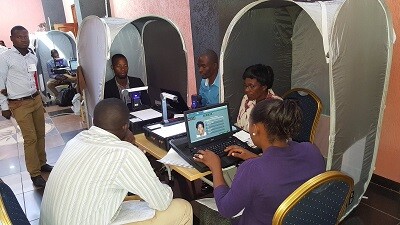
The Malawi Electoral Commission (MEC) is preparing to launch a crucial first phase of voter registration for the 2025 general elections amidst growing tensions between electoral authorities and opposition parties.
The registration drive, scheduled to begin October 21, 2024, will cover 14 councils across Malawi’s three regions, including the northern district of Chitipa, the commercial hub of Mzuzu City, and the southern district of Balaka.
This electoral cycle carries significance as it follows Malawi’s historic 2020 presidential election rerun, which saw opposition leader Lazarus Chakwera defeat incumbent Peter Mutharika after the courts nullified the 2019 results due to widespread irregularities.
That watershed moment marked the first time in Africa’s history that a presidential election was overturned by the judicial process and successfully rerun.
However, fresh controversies have emerged.
Opposition parties, including the Democratic Progressive Party (DPP), Alliance for Democracy (AFORD), and UTM, have raised alarm over the integrity of newly procured biometric voter registration kits.
The equipment, sourced from Laxton Group International, has drawn scrutiny due to the company’s alleged involvement in electoral controversies in other African nations.
AFORD Vice President Timothy Mtambo, a prominent figure in Malawi’s democracy movement and former leader of the Human Rights Defenders Coalition (HRDC), has demanded an urgent stakeholders’ meeting. “We can not repeat the mistakes of 2019,” Mtambo stated. “The credibility of our electoral process must be beyond reproach.”
MEC spokesperson Sangwani Mwafulirwa has maintained a firm stance on the registration timeline, which will run until November 3, 2024.
“Citizens must come prepared with their national IDs or valid passports,” Mwafulirwa emphasized. “There will be no extensions to accommodate late registrants.”
The controversy touches on deeper issues within Malawi’s electoral system. The country’s ‘first-past-the-post’ electoral system has historically produced presidents with less than 40% of the popular vote, leading to questions about mandate legitimacy.
The 2025 elections will also test recent electoral reforms implemented after the 2020 rerun, including new requirements for a 50%+1 majority to win the presidency.
Civil society organizations, including the National Initiative for Civic Education (NICE) and the Public Affairs Committee (PAC), have called for dialogue between MEC and political stakeholders. They emphasize that transparent procurement processes and stakeholder consensus are crucial for maintaining the democratic gains achieved since 2020.
The registration exercise represents the first major test of election preparations, with subsequent phases planned to cover the remaining districts. MEC aims to register an estimated 9 million eligible voters across the country 19 million people.
The commission faces the challenge of not only ensuring technical efficiency but also building public confidence in the process.
As Malawi approaches this critical period, the tension between electoral efficiency and stakeholder concerns highlights the delicate balance required in managing democratic processes in emerging democracies.
The resolution of current disagreements could set the tone for the entire electoral cycle leading up to the 2025 polls.














